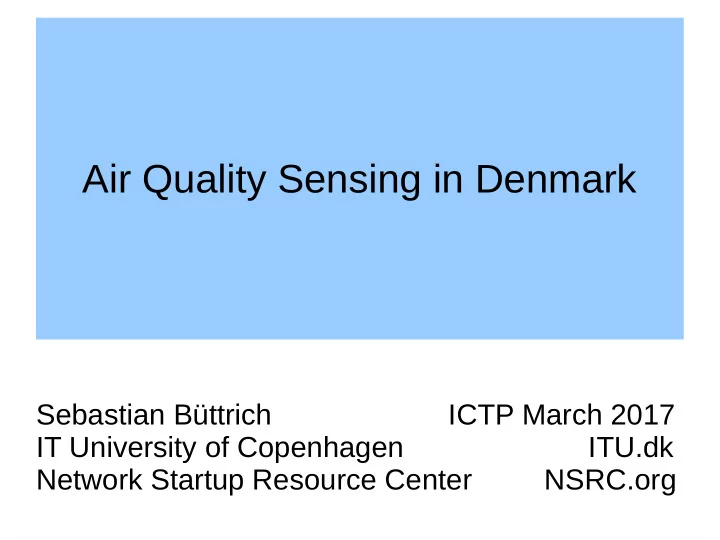

Air Quality Sensing in Denmark Sebastian Büttrich ICTP March 2017 IT University of Copenhagen ITU.dk Network Startup Resource Center NSRC.org
Meet Denmark
Meet Denmark
Meet Denmark
Meet Denmark
Meet Denmark
Meet Denmark
But things are not always green ...
But things are not always green ...
But things are not always green ... Source for international AQI : http://aqicn.org/
But things are not always green ...
Back in 2011, at IT University ... Project NoxDroid, http://noxdroid.org
NOxDroid Bike lights as air sensors
NOxDroid Sensors, Arduino/IOIO, cable, Bluetooth, Mobile phone, GPS/time ==> map
NOxDroid Live tracks
All worked well, but … a question:
What does it mean? 1/ What does the sensor measure? And what else? 2/ How precise? 3/ What is the threshold sensitivity? 4/ What gases are good indicators for Air Quality? We could do the IT/networks parts easily, But we needed to talk to air quality experts.
Introducing the Air Quality Index
Who is monitoring? Department of Environmental Science, Aarhus University http://envs.au.dk/en/knowledge/air/ Including knowledge base, real time data, modeling, and lots more Copenhagen monitoring station, video https://vimeo.com/39794264 NO2, PM model data http://lpdv-en.spatialsuite.dk/spatialmap? Copenhagen real time data http://www2.dmu.dk/atmosphericenvironment/byer/forside.htm
Who is monitoring?
Environmental Sciences
Environmental Sciences
Regional – Background - Street
Urban Modeling
Physical Modeling
Urban Background Model
From large scale to detail
What we learned 1/ Do NO2, O3 and maybe PM (but PM is difficult: relatively easy to measure, very difficult to interprete) 2/ Study the sensors in detail! So we left the things we know (apps, arduinos networks) aside for a while and looked at sensors . But before that, a quick look at PM vs. NO2:
Public data / Models / NO2
Public data / Models / PM10
Public data / Models / PM2.5
About Particulate Matter (PM)
About Particulate Matter (PM)
So ... … we looked at sensors used in citizen science … And it did not look so good ...
But wait: Wisdom of the Crowd? “The wisdom of the crowd is the collective opinion of a group of individuals rather than that of a single expert. A large group's aggregated answers to questions involving quantity estimation, general world knowledge, and spatial reasoning has generally been found to be as good as, and often better than, the answer given by any of the individuals within the group.”
Sensors of the Crowd? “Maybe your individual sensor is not good enough, but surely, if you have many …?” We will get back to that ...
Sensors for air, gases 1/ Pellistors 2/ Electrochemical 3/ Semiconductor cells 4/ Field Effect devices 5/ Mass sensitive devices 6/ Optical (mostly for PM) Our criteria: the 3 S Sensitivity Selectivity Stability Our enemies: Watts & $$$s
Sensors for air, gases 1/ Pellistors 2/ Electrochemical 3/ Semiconductor cells 4/ Field Effect devices 5/ Mass sensitive devices Our criteria: the 3 S Sensitivity Selectivity Stability Our enemies: Watts & $$$s
Semiconductor sensors
Semiconductor sensors
Electrochemical sensors
Electrochemical sensors
Electrochemical sensors
Sensors for Nitrogen dioxide NO2 (Low to moderate price!) SGX Sensortech Limited http://www.sgxsensortech.com/sensor-selector/ MICS-4514, -2710 MEMS MO Spec Sensors https://www.spec-sensors.com Alphasense (Electrochemical)
A look at citizen science projects e.g. the AirQualityEgg
A look at citizen science projects What are others using? e.g. the AirQualityEgg Important: I will say critical things about it here – NOT to be disrespectful, but to illustrate our shared challenges! Read more: http://citizensense.net/air-quality-egg/
Inside the AirQualityEgg “The standard AQ Egg has four built-in sensors - Temperature, Humidity, Carbon Monoxide, and Nitrogen Dioxide. Additional sensors can be added to the AQ Egg. These add-ons include an ozone sensor (MiCS 2610/2611 sensor), particulate matter sensor (Shinyei PPD42), and a VOC sensor (MiCS 5521 sensor).” MICS-2710
MiCS 2710 datasheet
AQE outputs
NO2 – what range is interesting?
Conversion: grams and ppm/ppb Molar mass of NO2: 46 (1 x 14 + 2 x 16) Molar Volume: approx 24 L ==> 1 ug = 0.5 ppb 1 mg = 0.5 ppm
NO2 – what range is interesting?
NO2 – what range is interesting?
We have a challenge ... Low cost sensors often have / sufficient sensitivity, but not at low concentrations (they may be OK for extremes, but not for typical days and our models) / cross-sensitivity / stability shortcomings We need to re-think our approach.
Back to our project
Back to our project
bAIR – next generation From $10 to ~$100 Alphasense electrochemical sensors NO2 – O3 Arduino-based system 16-bit ADC Temp/humidity Storage on SD card – currently no network (network is easy – sensors are hard! :) ) We reach 5 ppb precision theoretically (limited by the very small output voltage)
Current work Christian Kjær Jensen
Current work
Alphasense sensors
Current work Deployment next to routine monitoring station
Current work
Current work Calibration
Current work Calibration
Current work Calibration
Results Promising - We left “low cost” and moved to “reasonable cost” We can measure NO2 between 0 – 50 ppb with 5 ppb precision and reasonable stability With proper calibration (!), we are in good agreement with “expensive science”
What’s next for us? Mobility Put sensors on bikes again, Network connect via mobile, LoRa (!), WiFi Data Machine Learning and Sensor Calibration Sensors Add PM to our nodes Educate Work with schools and institutions
What’s next for us? Mobility Put sensors on bikes again, Network connect via mobile, LoRa (!), WiFi Data Machine Learning and Sensor Calibration Sensors Add PM to our nodes Educate Work with schools and institutions
Many other “new sensing” projects International & national pigeonairpatrol / plume labs
Many other “new sensing” projects Denmark CPHsense / Leapcraft
Many other “new sensing” projects Denmark CPHsense / Leapcraft
Many other “new sensing” projects Safecast: PM
Thank you! … questions? … suggestions? … improvements? sebastian@itu.dk sebastian@nsrc.org
Recommend
More recommend